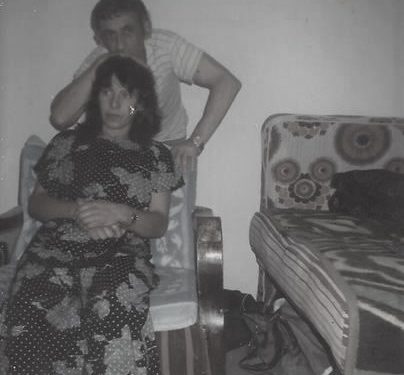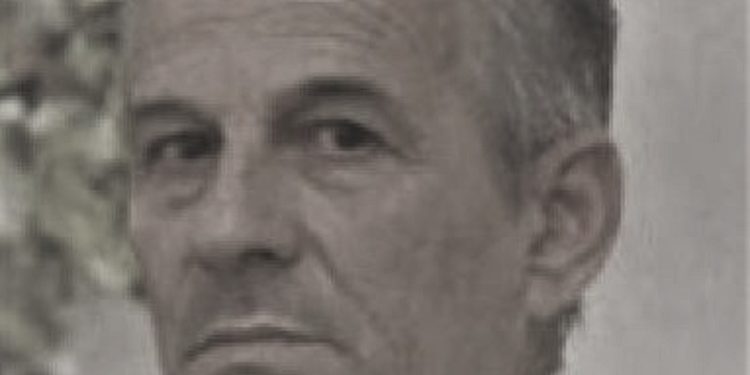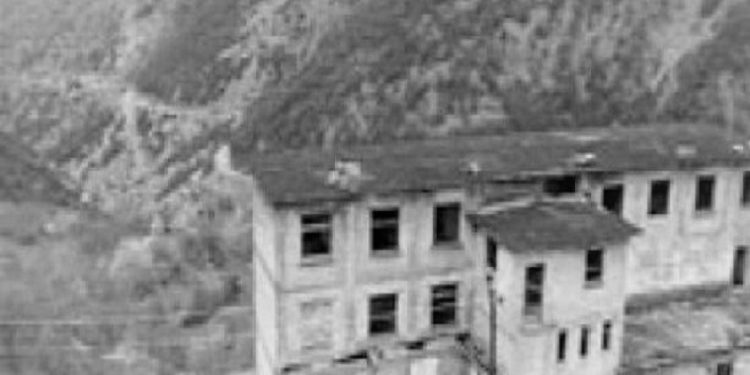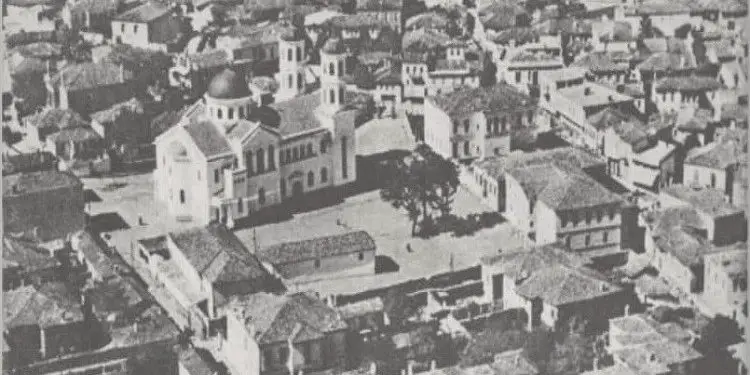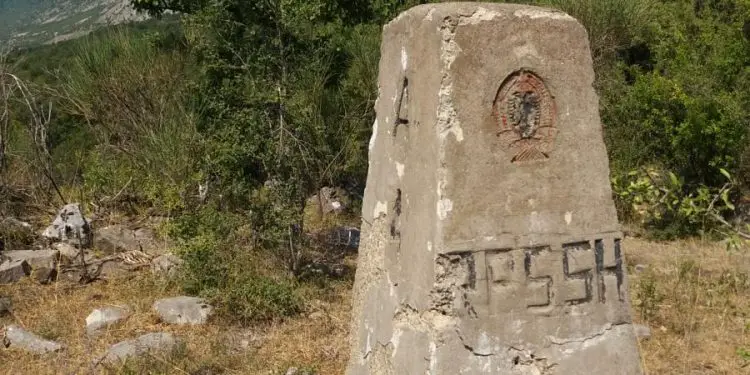From Vepror Hasani
Memorie.al / “I was completely in love with him”, says Yrmete Medolli, the wife of the well-known poet Gëzim Medolli. I was sure that one day everything would end in a wedding, where everyone would gather. Nothing could separate us, maybe not even death…! I knew that at our wedding, there would be lots of singing and dancing, while he would whisper his lines of poetry in my ear, to show me that he had written them just for me. (Joy had just finished his fourth year of high school, it was 1970). I knew, no one would be missing, neither his brothers nor his sisters, but at that wedding, neither his mother nor his father would be there…!
This saddened me, because Joy’s mother and father were a great worry. Joy had had a hard life, but surprisingly, nothing had defeated her. A year after his birth, in 1950, Gezimi’s father, Gani Medolli, escaped to Greece.
He named the last son Gëzim, perhaps hoping that one day, his children would be happy too…! He fled, because it was impossible for him to live, in his village in Trestenik i Devolli. The regime had begun to follow him, like an unwanted person.
His uncle, Xhemal Medolli, had been the chairman of the “National Front” during the War. For this reason, they shot him. The escape of the father made the life of the Medolli family even more difficult, but I still loved him, even though my family was considered to have a “good biography”. I would marry him, even if we were both sent to prison.
When Gezimi was 6 years old, his mother, Mukadezi, also died, but as he grew older, he began to express his pain through the verses he wrote. In his family, there would always be only shackles and prisons. However, I was in love with him and remained in love all my life”
Escape of Joy
“Suddenly in our village, in Trestenik i Devolli, a news spread that shocked many people. It was September 4, 1970. Someone came and told me that; Joy had been arrested. I was shocked. I can’t even describe it to this day. He had tried to escape, but he had been caught before he could cross the border. I could not contain myself. I hid somewhere and started crying. This started to happen to me often. My boyfriend was arrested!
I didn’t think he would run away, but I knew he always had an unspoken longing for his father. When we met together, he also talked to me about his father, Gani Medolli. He kept telling me: ‘How I would like to see him one more time… maybe one day I will meet him… I miss him…!
I know that even if he had stayed here, he would have died in prisons…’! Joy was only one year old when her father escaped. Maybe he wanted to come and see her and come back again. We had sworn to each other, to stay together forever.
But who would tell me all this?! Already the words ‘agent’, ‘criminal’, ‘traitor’ had started to be said about Gezimi, but only I knew who he was. I had recognized his soul, through verses. I hoped that he might even be released, but days passed and he was not coming back. Another news came to the village again: Gëzim Medolli had been sentenced to 10 years in prison for trying to escape.
That day remained unforgettable in my life. Perhaps for the first time, I hated the people of the government, I realized that the people of the regime and the good people always went in opposite directions, never to meet again. Joy had arrived in Spaçi prison. There he would write:
Good morning home!
I greet you…!
And why on backgrounds of trouble,
to lower the dawns…’!
I played lotto constantly…”, recalls the wife of the poet, Yrmete Medolli.
Waiting…!
“Even though he was sentenced to 10 years in prison, I decided to wait. He would come back and we would be together again, but it wouldn’t happen like this. When only three years had passed, on May 21, 1973, Gëzim Medolli was re-sentenced to another 25 years, because he had been among the 12 organizers of the Spaç Revolt. Again, I hid somewhere and cried. He would now be in prison for 35 years.
Later in 1980, I would learn another piece of news, just as shocking. Joy was re-sentenced with another 25 years in prison. That day, I had the impression that the whole world had gone mad. It wasn’t long before he was sentenced once again to 10 years in prison.
It was all over for him. He wouldn’t get out of there alive. I tried to learn something about him, but the news that came to me from the prison was scarce. I was sure, only of one thing: he would write verses there too, to overcome his pains and worries.
Later, I would read all these poems. He wrote poems about the shooting and hanging of prisoners, about obituaries and their fate, but also about hope and tomorrow….
‘They were falling from bullets,
next to oblivion;
They were starving
in the breast of scorn,
They depended on the cells
and the times were silent…
Galleries remain under stones,
obituaries that were never posted’!
I was already sure that I would never meet Gëzim Medolli. Even for Gezimi, I don’t believe there was any hope left! Meanwhile, I was married, but I don’t know why, I couldn’t get him out of my mind. My tears and pain were left…”!
Destiny to be together
“Fate wanted him to be released in 1989, when the wind of democracy seemed to approach. I heard that he had come to Korça. We met again. He began to tell me about the horrors he had experienced, the sufferings and the tortures. His stories were not over. He told and I listened to him, I cried like when I was 18 years old. Everything had been inhumane.
I already understood the meaning of his verses;
‘My existence,
a folder,
a number,
a tab…’!
He told me that he had always dreamed of meeting his father, he told me that he intended to try to escape again, but he did not tell anyone about this. He was afraid that he might be arrested again. With this thought, almost a year passed. He worked in the mine until 1990, where on one of these days, the news came that; Gëzim Medolli, had escaped again. He was on his way there to meet his father, but this meeting never happened”, recalls Yrmetja, Gezimi’s wife.
“The Athens police were told that his father had been found drowned under mysterious circumstances in the waters of the Aegean Sea, very close to the refugee camp in Llavrios. It was suspected that Enver Hoxha’s Security men had drowned him. After this terrible news, he had gone to the seaside, sat there and wept long. He cried and told his father everything that had happened to him. Both had no luck.
‘Father’, – he whispered there by the sea, you named me Gëzim, but I only had black days…’! He escaped, but only I knew he would return. Yes, he returned from there quite depressed, with the thought that he would never go to Greece again, but from time to time, he felt the desire to see the waters of the Aegean Sea, with the hope that between the waves and the waves, his father would appear his, whom he had never seen since he was one year old”.
Marriage
“It was at this time that we got married,” Yrmetja tells and remembers with pain, who had loved Medolli since her youth. “To be honest, I didn’t know where to start…! There was no house, nothing. Mehemet Medolli, his younger brother, took him to his house. With work, he was first assigned to the Bitincka mine and then to the one in Rehova. Now, when I read his poems, I like one of them very much. It is titled ‘Safe’.
‘We’ll meet somewhere, I know…
on the train, / tram, / in the lobby,
or…under a patch of rainy cloud.
We’ll kiss again, I feel it…
on the doorstep, in the grass, on the pier or…
under thousands of pieces of sun…’!
I read it and cry. After I married Gëzmi, we were taken to an old house that had once served as a school. There were no doors or windows. On December 2, 1992, we gave birth to Eliona. I remember it like today. It was very cold and snowing heavily. We had no light, no water, no bread, no clothes, no work. We moved like two shadows, in the dark, but in every corner of the room we went, it was equally cold. The house where we lived was more like a prison.
I often remembered his lines:
Pole by pole I weave the path,
there outside and inside…!
Sea to sea with heavy waves,
storm outside, frost inside.
Star by star, arrow by arrow,
On a hon with ice, I went…
Blood rose through the windows,
there outside, there inside…’!
Through that frost and ice, both of us, Joy and I, tried to warm Eliona’s little body with our souls. Our life was a real horror. We had no way to wrap it up. I remember that the neighbors helped us, they brought us everything they could, but our poverty remained permanent. In 1992, Gëzim Medolli was elected chairman of the “National Front” in Korçë, but we remained equally poor.
In 1996, he was elected general secretary of the “National Front” in Tirana, but after a year the riots started. Our hope for a better life had begun to end. Fortunately, in 1996, we settled into a regular apartment, but again we had nothing…!
Without bread…!
“In 1997 and following, our economic situation became even worse. We continued to be without water, without lights, without bread, without clothes, without everything else…! We spent the whole evening and late hours of the night without light. I remember that we prepared Eliona’s food by heating paper and boiling pasta in the coffee pot.
With this way of life, we would continue until 2004. The electricians came and cut off our lights because we couldn’t pay the energy bills, the watermen came and cut off our water. I went to one office, to another, to turn on the lights, but everyone closed the door on me; ‘Pay it’! – they told me.
Actually, it was not only us who did not pay, there were many others, but with our family, they behaved the same as when the Medolles had called them criminals. Every time Gezimi entered the house, he asked about the lights. “We won’t have it,” I answered. ‘What about water’? he asked me. ‘No water’, was my answer.
He was silent and depressed. ‘How many ALL have been unpaid to us, until now’? he asked after a moment of silence. Actually, he didn’t want the answer because we were unable to pay. I knew and was silent, he was also silent. We tried to secretly connect the energy, but they found out and came to us instantly. They were left without lights again…”!
The death of the poet
“It was April 30, 2004, when he entered the room and after a heart attack he died. Even that night, we had no lights. I will never forget that black night. On the desk where he was writing, there was only a pack of “DS” left, with five cigarettes, the halved match, glasses, a red and black flag and nothing else. We keep these items to this day. Eliona fell on his body and covered him with tears.
“Get up, father,” she told him, “Don’t leave me alone, I love you so much.” Please, father, open your eyes once more. Speak to me one more word, one more word’, Eliona wailed, but he remained silent. It seemed as if he was still asking: ‘Will we have lights today’?! Will we have water?! Is Eliona’s dinner ready?”, recalls Yrmete Medolli with pain.
“I removed Eliona from her father’s arms and said to her: Bring the red and black flag, because only for that flag, your father swore.” We covered it with the national flag. Only at that moment, it seemed to me that he warmed up, as if he began to calm down. He didn’t get to eat dinner. The next day we buried him, but I will never forget that he was buried without eating bread. After the news spread, many people came to our house. The death of Joy brought everyone together. That black night, we collected a lot of ALL.
The next day, I went to the electrician and with the money from Gezi’s death, I paid the electricity and water bills. Eliona continued to cry. “Don’t cry, Elona,” I told her, while in reality, I was saying the same verses that her father had written:
“Don’t cry Mirel…
He fled to the sky,
to collect the flowers.
Don’t cry Mirel…’!
He nodded straight,
heart of the sun,
to bring you the rays…
Don’t cry Mirel…
Do not Cry…”,
remembers Yrmetja, with the same pain that accompanied her all her life. /Memorie.al




